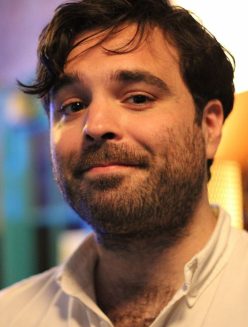Name: Ricardo Soltero-Brown
Hometown: Born in Washington, D.C.
Current Town: Orlando, FL
Affiliations: University of South Florida, B.A.; Horizon Theatre Company, playwright apprentice 2014-2015
Q: How do you self-identify?
A: Latino/American/Puerto Rican
Q: Tell me about The Rebellion.
A: The Rebellion begins on the set of a political film at the end of a troubled day of shooting. The director, Genevieve Laurent, gives the actor, Donovan Thompson, a note which leads him to a moral crisis over participating in the picture. After he’s disappeared for two days, Genevieve locates Donovan in his hotel room and does all she can to save the production. The play is about women’s inequality and men’s entitlement inside of the workplace, specifically in the arts; it’s also a comedy about the creative personality run amok. It’s the second part of a “trilogy” focused on sexual politics and gender relations inside theatre and film.
Q: What else are you working on now?
A: If you think I’m going to tell you the story of what I’m writing right now, you’re nuts.
Q: What have been the defining moments of your journey as a playwright?
A: Falling in love with dialogue would certainly be the first. I think directing my first few shorts did something for me, I couldn’t tell you what it was, though. I was devouring theory at the time, so I was trying things, rejecting things, confirming things, establishing things. We’ve been blessed with so many titans throughout Drama’s history, why wouldn’t we benefit from their writings, their knowledge, their successes and failures? Boal, Bogart, Chaikin, they all wrote it down. Why not read it? That said, it only makes sense now, seeing what other directors do with my work as some kind of revelation each and every time; maybe because how I write and what I write is different now. Not entirely, but it’s evolved. Yeah, let’s say evolved.
Q: Who have been your playwriting mentors and heroes?
A: Harold Pinter. Samuel Beckett. Caryl Churchill is a hero, though. Annie Baker, too. Donald Freed is overlooked. Ayad Akhtar wrote one of the best plays of the last 50 years. Lillian Hellman may prove the most integral playwright in my study of Drama, or so it seems with every play of hers I read. Suzan-Lori Parks breaks my heart. The NPX has proven an invaluable resource and I’ve been reading James Bartelle, Crystal Skillman, and a lot of Caridad Svich, one of the great CB radios of modern Drama communicating the myriad of America’s voices. Also, there was a teacher I had at USF who helped me to learn, listen to, and question Drama in ways I hadn’t before, and I thank him for that.
Q: What advice do you have for Latin@ playwrights at the beginning of their career?
A: Make it up. It’s about you anyway. It’s about your friends and family. Even if it’s a true story, there’s that pesky “behind closed doors” issue. Well, people make plays out of selected transcripts, so, I guess you could do that, too. Drama is everywhere, it’s in a piece of fruit that won’t cut, it’s in a cup of coffee after a hangover, it’s in a lightbulb that doesn’t turn on. Go with what excites you, what challenges you, what scares you. Often, though, I go with what makes me laugh. Lastly, don’t ever be afraid of writing a short play. Just complete something. Then complete something else.
Q: What else should we know about you?
A: Suzan-Lori Parks reminds us that moving around a lot as a kid could easily make a writer out of you. Being a Puerto Rican born in the states, I’m not exactly sure what I am; also I’ve moved around a lot. The history of Central America, Latin America, South America, the Caribbean, and the Antilles is too large to address here. There are natives, but many families go back to Spain or Africa, and the Middle East is between and just off to the side of those two. Stories of the Taíno are some of the best I’ve heard; I intend to tell one soon. I won’t tell you which, though. You see, I respond to the stories. Like anybody. I was born in the capital of this nation and that’s a matter of importance to me. I take this country personally. That includes everything it’s done, is doing, and will do. Saludos.
***For more on Ricardo Soltero-Brown, see:
- Read Ricardo Soltero-Brown’s plays on the New Play Exchange
- “Playwright Interview: Ricardo Soltero-Brown” – Ashleigh Gardner (Performer Stuff)
- Ricardo Soltero-Brown’s profile on Performer Stuff
- Follow Ricardo Soltero-Brown on Twitter

Pingback: Ricardo Soltero-Brown – Unknown Playwrights